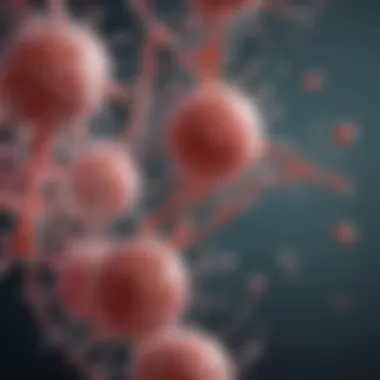Innovations in Biontech Cancer Vaccines: Key Insights


Intro
The landscape of cancer treatment is undergoing significant transformation, with advancements in vaccine technology leading the charge. Among the various players in this field, Biontech stands out due to its innovative application of mRNA technology to develop cancer vaccines. This approach not only introduces new avenues for personalized medicine but also shifts paradigms in oncology by targeting tumors more effectively.
Biontech's foray into cancer vaccines rests upon a sophisticated framework. Their vaccines harness the power of messenger RNA (mRNA) to prompt the immune system to recognize and attack cancer cells. This strategy represents a departure from traditional methods, steering away from standard therapies like chemotherapy and radiation. Instead, it repositions the immune system as a frontline defender against cancer.
The critical question looms: what makes Biontech’s approach particularly compelling? Through rigorous clinical trials, their methodologies reveal a commitment to scientific integrity and an eagerness to engage with the ethical and regulatory landscapes surrounding cancer treatment. The dialogue forged by Biontech between innovation and responsibility is pivotal, emphasizing the need for thorough research in a domain where stakes couldn't be higher.
In this article, we delve into the specific advancements made by Biontech. We will explore the intricate mechanisms of their vaccines, dissect preliminary results from clinical trials, and discuss the broader implications for cancer treatment in society. As we embark on this exploration, we aim to provide clarity on a topic that combines extensive scientific inquiry with profound ethical considerations.
Moreover, the integration of new technologies with patient-centric approaches marks a critical juncture in oncology. The following sections will illuminate pivotal research findings and the methodologies that made these breakthroughs possible.
Understanding Cancer Vaccines
Understanding cancer vaccines is crucial in today’s fight against a disease that has affected millions globally. With the rapid advancements in biomedical engineering and immunology, the topic is more relevant than ever. Cancer vaccines have the potential to not only combat existing cancers but prevent them in the first place. This section delves into the definition, purpose, and types of cancer vaccines, showcasing their significance in the broader context of oncology.
Definition and Purpose
A cancer vaccine, in its simplest terms, is a substance designed to elicit an immune response against cancer cells. Cancer vaccines leverage our body’s natural defense system, training it to recognize and attack specific cancer antigens, which can be proteins expressed by cancer cells. The purpose of these vaccines extends beyond merely treating cancers; they also aim to immunize individuals against the disease, thus reducing incidence rates.
The importance of understanding these definitions lies in recognizing the evolving landscape of cancer treatment. With traditional methods like chemotherapy and radiation often accompanied by severe side effects, the possibility of employing vaccines presents a less invasive alternative. Additionally, this approach seeks to empower the body, enabling it to defend against cancer autonomously.
Types of Cancer Vaccines
Cancer vaccines primarily fall into two categories: preventive and therapeutic. Each type serves different objectives and utilizes unique mechanisms to achieve them.
Preventive Cancer Vaccines
Preventive cancer vaccines are designed to avert cancer from developing in healthy individuals. A well-known example is the Human Papillomavirus (HPV) vaccine, which significantly reduces the risk of cervical cancer by targeting the virus responsible for most cases.
The key characteristic of these vaccines is their proactive nature; they don’t just work to improve health after a diagnosis but aim to diminish the incidence of cancer altogether. This quality offers a particularly beneficial aspect for public health, considering that prevention is generally more cost-effective than treatment.
A unique feature of preventive cancer vaccinations lies in their ability to generate lasting immunity. Once administered, they can provide protection for many years, thereby reducing the long-term burden on healthcare systems. However, there are limitations in their application. For instance, their effectiveness heavily relies on the population’s uptake, which may be hindered by public skepticism or misinformation around vaccines in general.
Therapeutic Cancer Vaccines
Therapeutic cancer vaccines come into play once cancer has already been diagnosed. These vaccines work by stimulating the immune system to identify and destroy existing cancer cells. A prominent example is the Sipuleucel-T, which targets prostate cancer.
The key feature of therapeutic vaccines is their reactive approach; they are tailored to enhance the patient's immune response against the specific cancer already present in the body. This characteristic makes them popular in the realm of clinical research as they can be integrated into existing treatment regimens, potentially improving survival rates positively.
However, therapeutic vaccines exhibit unique challenges as well. One disadvantage is that they may not be universally effective across all cancer types or patient demographics. The variability in patient immune responses means that some individuals may not respond optimally to the vaccine, leading to a complex set of variables in clinical trial outcomes.
Ultimately, understanding the different types of cancer vaccines is essential for grasping the potential pathways available in modern oncology, paving the way for innovative and effective treatment methodologies that could transform patient care.
In summation, cancer vaccines stand at the forefront of medical advances, offering both preventive and therapeutic options against a multitude of cancer types. With continuous research and development, understanding these foundations allows us to envision potential future applications and improvements in cancer treatment and prevention.
The Science Behind Biontech's Vaccines
Understanding the science driving Biontech's cancer vaccines is crucial for grasping their potential impact on the treatment landscape. With a background rooted deeply in biotechnology, Biontech has harnessed mRNA technology to forge a new frontier in immunotherapy. The complexity and sophistication of this science are striking, offering innovative pathways to mobilize the body’s own defenses against cancer cells.
mRNA Technology Explained
The cornerstone of Biontech's cancer vaccine efforts lies in its mRNA technology. At its core, messenger RNA (mRNA) is a molecule that serves as an intermediary between DNA and the production of proteins. Essentially, mRNA carries the genetic instructions from DNA to the ribosomes, where proteins are synthesized. Biontech's mRNA vaccines do something remarkable: they instruct cells to produce specific antigens corresponding to cancer cells. This antigen presentation triggers an immune response, teaching the body how to recognize and eliminate malignant cells.
This technology distinguishes itself from traditional vaccines. Rather than using weakened or inactivated pathogens, mRNA vaccines provide a blueprint—so to speak—allowing cells to create their own defense tools. The upside of this approach is significant:
- Rapid development: Due to the simplicity of manufacturing mRNA, these vaccines can be produced and modified with enormous speed compared to conventional methods.
- Precision targeting: mRNA can be tailored to target unique tumor-associated antigens, potentially leading to more effective treatments with fewer side effects.
- Robust immune response: By promoting a targeted immune response, mRNA vaccines can potentially create long-lasting immunity against certain cancers.
Biontech’s success with mRNA technology has set the stage for a new chapter in oncology, but it also brings with it challenges. Ensuring the stability and delivery of mRNA in the body is crucial; without proper encapsulation and formulation, the therapeutic potential can be lost.
Mechanism of Action


Diving deeper into the mechanisms at play, Biontech's vaccines typically utilize lipid nanoparticles to deliver mRNA. These tiny particles facilitate the transport of mRNA into cells by merging with cell membranes, thus enabling the mRNA to enter the cytoplasm. Once inside, the mRNA is translated into proteins, specifically those that mimic cancer cell antigens.
This translated protein then prompts a two-fold immune response:
- Recognition: The immune system identifies these foreign proteins as threats. Specialized cells, known as dendritic cells, present these antigens to T cells, which are pivotal players in the immune response.
- Activation: Once activated, T cells proliferate and are primed to attack any cell displaying the tumor-associated antigens, thus directly targeting cancerous cells throughout the body.
The efficiency of this mechanism has the potential to revolutionize cancer therapy. > "The mRNA-based approach not only stimulates a robust immune response but also has the capacity for customization depending on the patient's specific cancer profile."
As we move forward, the integration of this science into clinical practice will be vital. Patient outcomes hinge not just on the technology itself, but on how adeptly these vaccines can be personalized for individual patients, taking into consideration genetic profiles and unique cancer characteristics.
In summary, grasping the intricacies of Biontech’s innovative science illuminates the profound potential of mRNA technology in cancer treatment. Through ongoing research and clinical trials, the full scope of this technology’s capabilities is gradually emerging, promising not just hope, but a tangible shift in how we approach cancer therapy.
Clinical Trials: Biontech's Journey
Clinical trials play a crucuial role in the development of any medical treatment, particularly when it comes to vaccines. Biontech's oncological vaccines are no exception. The journey through clinical trials not only tests the safety and efficacy of these innovative therapies but also shapes the future of cancer treatment itself. Each phase of testing is designed to build upon the last, providing essential data that informs subsequent stages. This systematic approach is vital in ensuring that any vaccine advanced through the pipeline is not only effective but also safe for patient use. Additionally, these trials serve to refine methodologies and enhance the overall understanding of immune responses related to cancer.
Phase Trials
The first stage of testing often involves a small cohort of participants, usually ranging from 20 to 100 individuals. The primary focus during Phase I trials is to assess the safety profile of the vaccine. Biontech’s approach in this phase typically entails closely monitoring patients for any adverse effects following administration. Researchers are testing not just the drug itself but methods for administration and dosage. These insights are crucial since they inform dosage and treatment regimens for later phases.
Furthermore, there's keen interest in pharmacokinetics — how the body absorbs, metabolizes, and excretes the vaccine. One innovative feature from Biontech is their use of adaptive trial designs which allow for modifications based on interim results. If preliminary data shows promise in safety, adjustments can be made to expand the cohort size or gauge different dosing schedules.
Phase Trials
If Phase I trials yield positive outcomes, the research progresses to Phase II. This stage often includes a larger group, possibly involving hundreds of patients. Here, the focus shifts towards more detailed efficacy studies. Biontech evaluates how well their vaccine elicits an immune response against specific cancer antigens. This is where the rubber meets the road — the vaccine must demonstrate not just safety but also effectiveness in stimulating the immune system adequately.
Key Aspects of Phase Trials:
- Dose Optimization: Finding the right dose that maximizes immune response while minimizing side effects.
- Tailored Studies: Some Phase II trials assess responses in distinct cancer types or specific patient populations.
- Biomarkers Measurement: Measuring indicators that could forecast treatment success or inform about immune activation.
Results from this phase provide a clearer picture and guide to the final phase of trials, potentially altering treatment protocols based on observed patient responses.
Phase Trials
Phase III trials are the critical last leg before seeking regulatory approval. These trials typically enroll thousands of participants and are conducted across multiple sites. Biontech employs rigorous protocols to ensure a representative sample of the patient population. This phase is pivotal, as it aims to confirm efficacy and further review safety profiles in a larger and more diverse group.
The primary objectives in Phase III include:
- Comparative Effectiveness: Oftentimes, Biontech may use a controlled trial design against a placebo or existing standard treatments to measure comparative outcomes.
- Longitudinal Studies: Evaluating long-term efficacy and durability of the immune response produced by the vaccine.
- Population Diversity: Ensuring inclusion of various demographic groups, which helps gather data pertinent to different biologies.
It’s during this phase that data is compiled for regulatory submissions like to the FDA or EMA, highlighting both the prospective benefits and any concerns regarding side effects or complications. Ultimately, Phase III results lay the foundation for how Biontech’s treatments would change everyday clinical practice, turning theoretical approaches into real-world applications.
Clinical trials form the backbone of vaccine development. Without them, innovations like Biontech's cancer vaccines would remain unrealized potential.
Overall, Biontech's journey through clinical trials not only reflects their commitment to advancing cancer treatment but also signifies a transformative shift towards more personalized and adaptive approaches in oncology.
Regulatory Challenges and Approvals
Regulatory challenges and approvals are fundamental parameters in the pursuit of developing cancer vaccines, especially those created by Biontech. In the realm of biotechnology, navigating through these regulatory landscapes is akin to steering a ship through a tempest; one misstep can lead to derailment or delays that hinder patient access to potentially life-saving treatments. Therefore, understanding these obstacles is crucial for stakeholders involved in the development and distribution of cancer vaccines.
The approval from regulatory bodies ensures that every vaccine meets stringent safety and efficacy criteria before reaching patients. This helps maintain public trust, which is pivotal in therapeutic settings where skepticism may linger among patients. Additionally, a well-defined approval process can enhance collaboration between pharmaceutical companies and regulatory agencies, laying a solid foundation for trust and transparency. It also facilitates scientific exchanges that can lead to innovative solutions in oncological treatments.
The journey doesn’t end post-approval. Continuous monitoring and evaluations are vital. These post-marketing surveillance efforts help ensure that any long-term effects or adverse reactions are tracked, further validating the vaccine's relevance in clinical practice.
FDA Approval Process
The FDA approval process represents one of the most rigorous pathways in the regulatory landscape. Primarily, the journey begins with preclinical studies that assess the vaccine's safety profile and its initial effectiveness. Validating these studies sets the stage for moving into clinical trials. The FDA categorically defines a set framework comprising three phases.
- Phase I Trials: Here, the primary focus is on safety. A small group of volunteers receives the vaccine, and their responses are monitored closely. This phase zeros in on identifying any immediate adverse effects.
- Phase II Trials: Once safety is established, the vaccine is administered to a larger cohort. This phase evaluates both safety and efficacy, often aiming at a specific cancer type. It’s a critical step for understanding how the vaccine performs over a broader demographic.
- Phase III Trials: The final phase requires an expansive participant pool. These trials compare the vaccine's effects against a placebo, determining its ability to improve patient outcomes significantly.
Upon successful completion of these phases, a New Drug Application (NDA) is filed. The FDA then conducts a thorough review process, which can take several months, potentially extending longer if further data is requested or if issues arise.


"The approval by authorities is not merely a seal of authenticity; it’s a lifeline to patients awaiting relief from devastating diseases."
Global Regulatory Variations
The landscape of regulatory approvals goes beyond the shores of the United States, with global variations significantly impacting how and when new therapies, including vaccines, reach markets in different countries. Each country boasts distinct regulatory requirements, reflective of its health policies and medical practices.
Countries in the European Union follow the European Medicines Agency's guidelines, which encompass a similar yet nuanced set of procedures compared to the FDA. Aspects such as quality and safety data collection, as well as the length of the approval process, may vary widely. Often, the data compiled during clinical trials may fulfill multiple national agency requirements simultaneously, yet not without modifications.
The intricate variations in regulations can lead to timelines that diverge. For instance, a vaccine may receive speedy approval in one jurisdiction due to a public health emergency, while in another, traditional pathways might necessitate years of evaluation.
One aspect that deserves careful consideration is how variations in local healthcare infrastructure could influence accessibility post-approval. While a vaccine may receive full regulatory endorsement, if local health systems are under-resourced, delivery to patients may be far from guaranteed.
Thus, comprehending these varied landscapes is essential for pharmaceutical companies, researchers, and patients alike. Establishing a widespread understanding allows for enhanced preparedness when introducing revolutionary concepts in oncology into diverse global markets.
Recent Developments in Biontech Cancer Vaccines
In the fast-paced world of oncology, the recent advancements in Biontech's cancer vaccines stand out as a crucial component in the ongoing battle against various types of cancer. This section emphasizes the significance of these developments, reflecting how they not just expand the horizon of personalized medicine but also open doors to innovative treatment pathways that were once thought to be mere science fiction.
Latest Research Findings
Recent studies have shed light on how Biontech’s cancer vaccines utilize mRNA technology to instruct the body’s cells to produce antigens. These antigens then trigger an immune response tailored specifically to the patient’s cancer cells, making treatment not just effective but personalized. One pivotal finding from Biontech’s recent research showed remarkable results in patients with melanoma, where the vaccine demonstrated a higher rate of tumor reduction compared to traditional therapies.
The implications of these results stretch far beyond individual cases; they hint at a broader trend of vaccine-based therapy gaining traction in clinical settings. Furthermore, research published in The Journal of Oncology indicates that combining Biontech’s vaccine with existing therapies like checkpoint inhibitors has significantly enhanced overall survival rates. This synergy could very well usher in a new era of comprehensive cancer care, where vaccines play a central role alongside conventional treatments.
"The capacity for mRNA vaccines to adapt at a rapid pace could revolutionize the approach to cancer therapy," notes Dr. Emily Hart, a leading oncologist involved in clinical trials.
Collaborative Projects
Collaboration has proven to be a catalyst for innovation in cancer treatment, and Biontech’s partnerships have showcased this beautifully. For instance, its ongoing collaboration with Pfizer set the stage for some of the groundbreaking COVID-19 vaccines that have garnered attention worldwide. Applying similar principles, Biontech is now collaborating with several research institutions to develop combination therapies that leverage the strengths of both mRNA vaccines and traditional treatment methods.
Moreover, initiatives like the partnership with the German Cancer Research Center aim to explore novel ways to enhance immune response through strategic vaccine formulations. These collaborative efforts are not just academic; they bring together expertise from various fields that can stimulate fresh perspectives on tackling challenging cancers—especially those that have shown resilience against standard treatments.
Biontech's Role in Marine Biotechnology
The convergence of marine biology and biotechnology has opened new avenues for research, creating opportunities that can revolutionize the field of treatment and prevention. Biontech, often hailed as a pioneer in mRNA technology, stands at the forefront of this integration. The potential to exploit marine resources for the development of vaccines represents a critical aspect of their innovative approach in cancer therapy.
Innovations Stemming from Marine Biology
When we take a deep dive into marine biology, what we find is nothing short of remarkable. Marine organisms have evolved over eons, developing unique biochemical pathways that can offer insights into novel solutions to human ailments. Biontech has recognized these opportunities, actively researching compounds derived from marine species that may contribute to the enhancement of their vaccine efficacy.
For instance, certain algae and sponges produce bioactive compounds that might help optimize immune responses or act as adjuvants that can potentiate the effectiveness of vaccines. Biontech focuses on understanding these biological interactions in an effort to harness their potential. The following are key innovations attributed to marine biology that could influence Biontech's vaccine development:
- Natural Compounds: Extracts from sea creatures or plants may provide unique mechanisms for targeting cancer cells more effectively.
- Genetic Insights: The genomics of marine species might reveal new targets for mRNA vaccines, which could translate into more precise therapies.
- Adaptation Mechanisms: Understanding how marine species adapt to their environment offers invaluable lessons on resilience and transformation that can be applied to vaccine technology.
These innovations not only pave the way for the next generation of cancer therapies but also underscore an important shift in how biotechnology companies like Biontech view the natural world as a resource for scientific advancement.
Future Directions in Marine Applications
Looking ahead, the integration of marine biotechnology into Biontech's research framework presents a myriad of possibilities to exploit aquatic resources for effective cancer treatment solutions.
As the company broadens its horizon, the potential future directions could include:
- Collaborative Efforts with Marine Biologists: Partnering with marine research institutions can bolster research capabilities, leading to groundbreaking discoveries that may be otherwise overlooked.
- Sustainable Practices: Biontech could lead the charge in sustainable harvesting of marine resources, ensuring that their efforts in vaccine development do not compromise marine ecosystems.
- Clinical Trials Involving Marine-Derived Entities: Future clinical trials may evaluate the effectiveness of novel marine-derived antigens in combination with existing mRNA platforms.
- Investment in Marine Biotechnology Startups: Purchasing stakes or forming alliances with marine biotech firms allows Biontech to stay ahead in innovation by sourcing the latest discoveries.
In summary, Biontech's venture into marine biotechnology is more than just a side project; it's a strategic initiative that could position the company as a leader not only in oncology but also in the broader context of biopharmaceutical development. This multifaceted exploration of marine resources is vital for enhancing the efficacy of cancer vaccines while fostering a sustainable approach to therapeutic development.
Ethical Considerations in Vaccine Development
As technology pushes the frontier of what is possible in medicine, ethical considerations in vaccine development stand front and center. This holds especially true for Biontech's cancer vaccines, which utilize cutting-edge mRNA technology. Beyond the science and efficacy, understanding the ethical landscape is crucial for fostering public trust and ensuring equitable access.
Ethical issues weave themselves into several fabric strands of vaccine development. These include but are not limited to critical patient consent processes, transparency in clinical research, and ensuring that the benefits of these advancements are shared broadly within society, rather than becoming just another privilege of the few.


Patient Consent and Transparency
In the realm of medical research, informed consent is a bedrock principle. For Biontech's vaccines, transparency regarding trial protocols and potential risks associated with the new technology becomes paramount. Patients volunteering for trials must be fully briefed. This isn’t merely a regulatory checkbox; it is about respect and recognition of autonomy.
During the consent process, researchers must clearly outline:
- The nature of the vaccine and its mRNA technology
- The purpose of the clinical trials
- Possible side effects and benefits
- The duration of participation and follow-up procedures
Moreover, any changes during the trial phase must be communicated effectively to the participants. Ignoring these facets can lead to mistrust, and once trust is broken, it can be difficult to mend. The aim should be not only to comply with legal requirements but to engage in an ongoing dialogue with participants, fostering an environment of mutual respect and understanding.
"The measure of a society can be how well its people are treated, especially during pivotal interventions like vaccine trials."
Distribution Equity
Fair distribution of vaccines is another crucial ethical frontier. As the advanced technology behind Biontech's vaccines promises to revolutionize cancer treatment, care must be taken to ensure that these benefits aren’t confined to specific demographics or geographic areas. Vaccines should ideally be accessible to those who need them most, transcending barriers imposed by income, race, and geography.
Key points to consider include:
- Global Access: Ensuring that low- and middle-income countries receive equitable access to these vaccines is vital. Collaborations with international health organizations can help address these disparities.
- Affordability: Innovations must not merely be cutting-edge; they should also be economically viable. Pricing strategies should reflect a commitment to public health rather than mere profit margins.
- Community Engagement: Working alongside communities to understand their needs and concerns can help tailor distribution strategies that resonate with the populations most affected.
By embedding these ethical considerations into the framework of vaccine development, particularly in the context of Biontech's advancements, we not only propel scientific progress but also uphold the foundational values of healthcare—justice, respect, and compassion. The road ahead is riddled with challenges, but addressing these ethical elements head-on can pave a more trustworthy pathway in cancer vaccine innovation.
Future Implications of Biontech's Cancer Vaccines
The future of Biontech’s cancer vaccines represents a pivotal shift in oncology. It’s not just about technology; it’s about how we’ll approach cancer treatment in the coming years. Biontech has carved a unique niche with its mRNA-based therapies, setting the stage for a new age in vaccine research and cancer treatment. Understanding the dynamics at play here is crucial for anyone invested in the future trajectory of medical science.
Potential Expansions in Cancer Treatment
There's a growing anticipation around Biontech's potential to expand treatment options beyond the confines of traditional therapies. Currently, cancer treatment often revolves around chemotherapy, radiation, and surgical procedures, each with varying degrees of success and side effects. Biontech’s approach, particularly through its mRNA technology, introduces a more precise, personalized avenue of care.
- Combination Therapies: The integration of Biontech’s vaccines in combination with existing treatment modalities could enhance overall efficacy. For instance, pairing mRNA vaccines with immune checkpoint inhibitors may boost immune response, leading to better outcomes for patients.
- Broader Cancer Types: Ongoing research might open doors for treatments against a wider range of cancers. While initially focused on melanoma and prostate cancer, Biontech could soon explore therapies for breast, lung, and other cancers that have proven notoriously difficult to treat.
- Prophylactic Vaccines: There’s also potential for preventive applications. Biontech could pioneer vaccines that prevent cancer from developing in at-risk populations, much like traditional vaccines do for viruses.
With such advancements, Biontech's vaccines might completely transform the landscape of cancer treatment, leading to protocols that are tailored, adaptive, and focused on individual patient needs.
Long-Term Impact on Oncology Practices
The implications of Biontech’s vaccines extend deeply into the very fabric of oncology practices on a macro scale. Healthcare systems may need to reevaluate current practices, not only for treatment but also for research and patient care. Considerations here are multifaceted:
- Shift in Treatment Paradigms: As Biontech’s vaccines potentially shift how oncologists approach treatment strategies, medical education may require realignment. Future oncologists might be taught not just about traditional therapies but also cutting-edge vaccine technologies, changing how they interact with patients and formulate treatment plans.
- Patient-Centric Care: Enhanced efficacy of cancer vaccines could pivot the focus towards a more patient-centered approach. This means that patients will likely have more say in their treatment pathways, and oncologists will work collaboratively with patients to design targeted strategies.
- Cost-Effectiveness: Though the initial investment in research and development is high, successful implementation of Biontech’s vaccines could ultimately reduce long-term healthcare costs by minimizing the need for aggressive treatments and hospital stays linked to side effects from conventional therapies.
- Broader Accessibility: There is a possibility that as these therapies become more mainstream, they will be integrated into various healthcare systems globally. This accessibility could bridge significant gaps in treatment options between wealthy and under-resourced regions.
In the grander scheme, the long-term impact of Biontech’s innovations stands to reshape not only patient experiences but also the broader healthcare ecosystem. In closing, the future implications of Biontech’s cancer vaccines hold the promise of not just advancements in treatment but a revolutionary evolution of oncology itself.
Cancer treatment is no longer about fighting it, but equipping the body to combat it effectively.
The End and Summary of Findings
In wrapping up the exploration of Biontech's advancements in cancer vaccines, we spotlight the pivotal role these innovations hold in transforming cancer treatment. The article journeys through essential elements, revealing how Biontech's approach intertwines cutting-edge science with intricate processes that aim to confront various forms of cancer. By leveraging mRNA technology, Biontech not only pioneers new treatment modalities but also sheds light on ethical considerations that unfold alongside scientific breakthroughs.
The significance of this analysis extends beyond a mere overview of vaccines. It encapsulates the potential they hold—both in obliterating current obstacles in oncology and in redefining therapeutic paradigms for future generations. This is no small feat; it involves dissecting multilayered research findings, regulatory complexities, and a keen eye on ethical implications.
Moreover, several factors underscore the benefits and considerations around Biontech's cancer vaccines:
- Innovative Technology: The introduction of mRNA technology in vaccines heralds a new horizon in targeted cancer therapies, potentially leading to more personalized treatment options.
- Clinical Successes: Notable results from clinical trials signal hope, suggesting increased efficacy and fewer side effects compared to traditional therapies.
- Global Access and Equity: There’s an ongoing conversation about ensuring these life-saving vaccines are accessible to diverse populations, highlighting the importance of equitable distribution.
This narrative solidifies the understanding that advancements in cancer vaccines are on the frontier of oncology, not merely adjuncts to existing treatment methods but revolutionizing the very foundation of how we understand and tackle cancer.
Key Takeaways
- Advancements in Biontech’s cancer vaccines illustrate the monumental shift in treatment approaches, propelled by mRNA technology.
- Clinical trial phases exhibit promising outcomes, showcasing the potential for these vaccines to change patient trajectories.
- Ethical considerations underline the necessity of transparency and equity, as rapid advancements invite scrutiny and expectation from the wider community.
Looking Ahead
As the landscape of cancer treatment continues to evolve, several questions arise regarding the future implications of Biontech's innovations:
- Expansion into Other Tumor Types: Future research may well extend beyond current cancer indications, exploring how these vaccines can be adapted for other malignancies.
- Long-Term Monitoring: It's vital to examine the long-term effects and durability of responses elicited by Biontech’s vaccines, evaluating any potential late-onset side effects or effectiveness waning over time.
- Integration with Other Therapies: Future research endeavors should also consider how Biontech's vaccines can be seamlessly integrated with existing treatment modalities to provide multifaceted approaches to cancer management.
In essence, the trajectory of Biontech’s cancer vaccine development is filled with both excitement and caution. The path ahead is poised with opportunities that could reshape the foundations of cancer treatment, ushering in a new era that combines enhanced technology with ethical standards in patient care.







